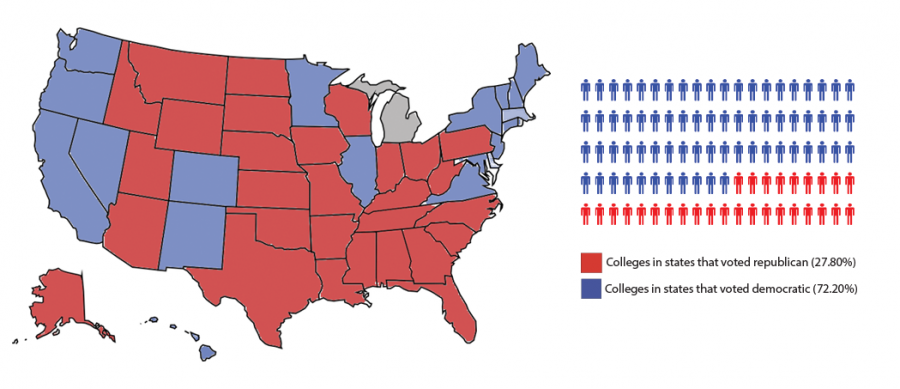Sitting in the lounge of her dorm at the University of Michigan, Katie Kreshek ’16 felt her stomach sink as she watched Donald Trump’s electoral votes rise. Around her, she heard the cheers of some of her peers as state after state went red.
“It wasn’t until after the election that I realized how much I naturally gravitated towards students who came from major cities and backgrounds similar to my own,” Kreshek said. “Sitting in that lounge was the beginning of a culture shock.”
Kreshek began to notice the stark difference in political discussion between her hometown and her new city.
“At Harvard-Westlake, even when there were disagreements in political opinions everyone could understand each others’ perspectives at the very least and have intelligent discussions without immediately dismissing each other,” Kreshek said. “Here some people have been raised in different ways that I’m ignorant of coming from my background and discussion doesn’t come as easily.”
Of the 524 students who have graduated from Harvard-Westlake in the past two years, 154 now go to school in states that voted Republican in the presidential election. This was a noticeable shift from the liberal climate of Los Angeles where 71.5 percent of the population voted Democratic in the election.
Some students found these changes particularly striking after the election, they said, when incidents fueled by racism began to occur.
In the days following the election, African-American freshmen at the University of Pennsylvania were added to a group messaging thread on the app GroupMe, which contained racial slurs and lynching threats, according to the Daily Pennsylvanian.
While the person responsible was found to be a University of Oklahoma student, the attack targeted UPenn students.
“The fact that these students were specifically targeted and individually added to a GroupMe is sickening,” UPenn sophomore Elizabeth Goran ’15 said. “I know that older black friends of mine have brought up the fact too that these are just freshman who are still trying to get adjusted to college and now have to deal with the added weight of not feeling safe on their own campus.”
Similar events took place on Kreshek’s college campus, where a student wearing a hijab was threatened with being lit on fire, University of Michigan President Mark Schlissel said in a letter to students.
Incidents on campus were not one-sided, with many Trump supporters being called racist by their classmates for their political beliefs, Schlissel also said in his letter.
Events like these were not confined to states that voted for Trump in the presidential election.
At Kayla Darini’s ’16 college, Colgate University in Hamilton, New York, she said Hillary Clinton supporters were faced with degrading comments in group messages of Republican students on campus.
“While the school is making an effort to ease tensions, it’s obvious that people are not being as sensitive to people with differing opinions on the election,” Darini said. “One of the things our school’s President said in an email the other day was that we need to be aware of how our comments impact the community. People are obviously not considering how traumatic this election is for many people.”
For Emily Plotkin ’13, a senior at Emory University in Atlanta, election results came more in the form of peaceful protests against the president-elect.
“This election truly divided the country like nothing else I have ever experienced, and there was a lot of frustration and anger after the election,” Plotkin said. “There was a walk of silence that took place on campus the day after the election; people walked through campus dressed in black and marched in silence and solidarity ‘for the healing of the hate in our country.’”
Kreshek said she experienced a change in classroom discussions following her move to a red state.
“In my philosophy class on inequality, discussion topics like gender inequality have at times led into conversations about issues like abortion that have been surprisingly difficult to engage in,” Kreshek said. “I’ve definitely had to acknowledge the influence that Los Angeles has had on me in order to engage in discussion on a lot of the social issues that made this election so polarizing.”
Some alumni said, however, they didn’t notice this difference on their campuses but rather in the communities surrounding them.
“On campus, it’s great and people here agree with my beliefs,” Oberlin College freshman Taylor Ingman ’16 said of her school located in Ohio. “But as soon as I wander into town, things aren’t as friendly.”
Ingman cited recent community incidents as examples of the political divide that she has seen following the presidential election.
An Oberlin-based biker gang recently painted over rocks on campus covered in statements such as “Black Lives Matter” with the words “All Lives Matter” and “President Trump.”
Other alumni, however, have not experienced a large shift in the political environments on their campuses, despite the fact that they are now in red states, due to the typically liberal atmosphere of college campuses and metropolitan cities.
“The effect was actually negligible, and I honestly could hardly notice,” Washington University in St. Louis sophomore Brian Adler ’15 said. “St. Louis is actually a blue city, despite being in an overwhelmingly red state.
Because of that, daily life here is really not too different from being in Los Angeles, which is also overwhelmingly blue. St. Louis has a ton of liberal policies, too. That being said, there are state policies that occasionally make you realize you really are in a pretty red state.”



























